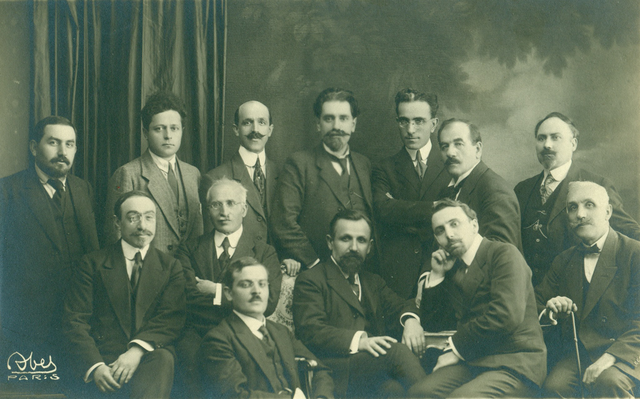Loading AI tools
From Wikipedia, the free encyclopedia
The Paris Peace Conference gathered over 30 nations at the Quai d'Orsay in Paris, France, to shape the future after World War I. The Russian SFSR was not invited to attend, having already concluded a peace treaty with the Central Powers in the spring of 1918. The Central Powers - Austria-Hungary, Germany, Bulgaria and the Ottoman Empire - were not allowed to attend the conference until after the details of all the peace treaties had been elaborated and agreed upon. The main result of the conference was the Treaty of Versailles with Germany.


This list shows all nations and delegations who signed the Treaty of Versailles. All plenipotentiaries signed the treaty, except where indicated otherwise.[1]


Despite not signing the treaties, other delegations were sent to the Paris Peace Conferences, some uninvited, in order to represent their national interests.
| Nation | Representatives | Notes | |
|---|---|---|---|
| Faisal Lawrence of Arabia | Faisal, later King of Iraq, advocated for an independent Arab state. T.E. Lawrence acted as the delegation's translator.[2][3] | ||
| Avetis Aharonian Hamo Ohanjanyan Armen Garo | [citation needed] | ||
| National Committee of the Pindus | Attempted to establish an autonomous Aromanian entity.[4] | ||
| Bishop Aphrem Baroum | Attempted to establish an autonomous Assyrian entity in the Assyrian homeland.[5] | ||
| Alimardan bey Topchubashov | [citation needed] | ||
| Anton Luckievich | Attempted to gain international recognition of the independence of Belarus.[6] | ||
| Jaan Poska Nikolai Köstner Jaan Tõnisson Ants Piip Karl Robert Pusta Mihkel Martna Eduard Laaman Joakim Puhk | Attempted to gain recognition of the independence of Estonia.[7][8] | ||
| Nikolay Chkheidze Irakli Tsereteli Zurab Avalishvili | [citation needed] | ||
| Seán T. O'Kelly | The unrecognized Irish Republic sent representatives in hope the republic declared at the Easter Rising in 1916 would be recognised, but they were ignored.[9][10] | ||
| Kim Kyu-sik | Representing the Provisional Government of the Republic of Korea, in-exile in China.[11] | ||
| Şerif Pasha | Representing Society for the Rise of Kurdistan and its goal to establish an independent country, or an autonomous entity, in Kurdistan.[12] | ||
| Jānis Čakste | Attempted to gain recognition of the independence of Latvia.[7][13] | ||
| Daoud Amoun (first delegation) Elias Peter Hoayek (second delegation) Abdullah El-Khoury (third delegation) | Three separate delegations were sent to attempt to: expand the borders of Mount Lebanon Mutasarrifate and to gain recognition of the independence of Lebanon.[14][15][16] | ||
| Augustinas Voldemaras Antanas Smetona | Attempted to gain recognition of the independence of Lithuania.[7][17] | ||
| Nicholas I of Montenegro | The unification of Serbia and Montenegro on 18 November 1918 was contested by the exiled king of Montenegro. Despite Italian support, Montenegro was denied an official seat at the Peace Conferences, and the unification of Serbia and Montenegro was recognised.[18] | ||
| William F. Lloyd | [19] | ||
| Abdulmajid Tapa Tchermoeff | [citation needed] | ||
| Mostowfi ol-Mamalek | Iranians, as a neutral power, negotiated war reparations to both, Allies and Central Powers (suggesting Ottoman and Russian territory) due to Persian campaign.[20] Also solicited French or American help to seizure independence from Anglo-Russian spheres of influence in Persia.[21] | ||
| Sergey Sazonov | The Allied Powers refused to recognise the Bolshevik government of Russia, and instead invited representatives of the Russian Provisional Government (chaired by Prince Lvov), the successor to the Russian Constituent Assembly and the political arm of the Russian White movement.[22][23] | ||
| M. Bucquet | [24] | ||
| Chekri Ganem Jamil Mardam Bey | See Central Syrian Committee. | ||
| Lobbied for the independence of Tripolitania from Italian Libya.[25] | |||
| Hryhorii Sydorenko Mykhailo Tyshkevych | Lobbied for the independence of Ukraine and for support in its war against Russia.[26] | ||
| Nguyen Ai Quoc | Nguyen Ai Quoc (later known as Ho Chi Minh) petitioned the conference, seeking self determination and independence for the Vietnamese people.[27][28] | ||
| Vasyl Paneiko | Lobbied for the independence of West Ukraine.[26] |

Other non-national or pan-national delegations were in Paris, hoping to petition the allies on issues relating to their causes.
| Group | Major People | Notes |
|---|---|---|
| 1st Pan-African Congress | W. E. B. Du Bois Ida Gibbs | Held in February 1919 in order to petition the allies on African issues. |
| Inter-Allied Women's Conference | Marguerite de Witt-Schlumberger | Convened and met from 10 February to 10 April 1919. |
| Dr. Chaim Weizmann | Lobbied for the establishment of a Jewish state in Palestine.[29] |
An oft-stated myth is that the Principality of Andorra was not invited to attend, due to an 'oversight' and that the issue of Andorra being at war was eventually resolved on September 24, 1958, when a peace treaty was signed. This claim first appeared in North American newspapers in 1958[30][31] and has been repeated since.[32][33] In reality, Andorra did not officially participate in World War I.[34] In 2014, the news outlet Ràdio i Televisió d'Andorra investigated the 1958 claim and could find no documentation of any original declaration of war. Historian Pere Cavero could only find an exchange of letters between the German consul in Marseille and the Catalan Ombudsman, where the former asks if there is a state of war with Andorra and the latter responds they could find nothing in their archive to indicate this.[35]
Seamless Wikipedia browsing. On steroids.
Every time you click a link to Wikipedia, Wiktionary or Wikiquote in your browser's search results, it will show the modern Wikiwand interface.
Wikiwand extension is a five stars, simple, with minimum permission required to keep your browsing private, safe and transparent.